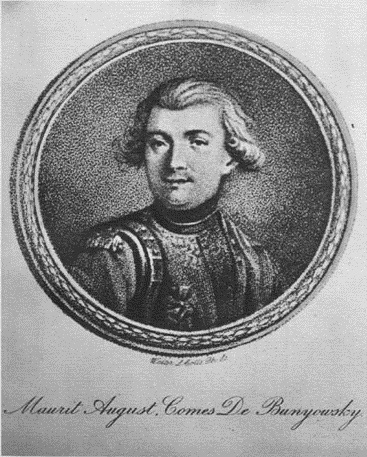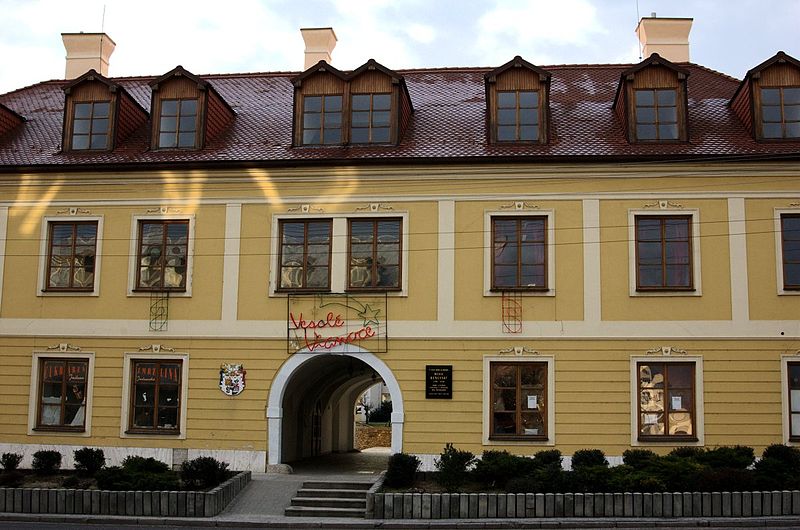<Back to Index>
- Political Philosopher Leo Strauss, 1899
- Writer Upton Beall Sinclair Jr., 1878
- Explorer and Colonial Administrator Maurice Benyovszky, 1746
PAGE SPONSOR


Maurice Benyovszky, (Hungarian: Benyovszky Móric, Polish: Maurycy Beniowski, Slovak: Móric Beňovský) born as Benyovszky Móric Ágost (20 September 1746, Vrbau (Vrbové), Habsburg Monarchy, now Slovakia – 23 May 1786, Madagascar), was a Hungarian count with Hungarian, Polish and Slovak ancestry. He was a globetrotter, explorer, colonizer, writer, chess player, ruler of a community in Madagascar, a French colonel, Polish military commander, and Austrian soldier. Benyovszky could speak more than five languages. Regardless of his nationality, he is a pride of three nations: Hungarian, Slovak, and Polish.
Benyovszky was a Hungarian count of Hungarian, Slovak and Polish background. His father was Samuel Benyovszky from the Trencsén county (Trenčín, present day Slovakia) of the Kingdom of Hungary. His mother, Rozália Révay, was a baroness, from the noble Hungarian Révay family, and was the widow of a general when she married Benyovszky's father. In the 16th century, after the Battle of Mohács the Hungarian family moved from southern to northern Hungary, away from the territory invaded by the Ottomans.
The Benyovszky family has a long history. The ancestors of the Benyovszky family left Hungary to Poland, when the king was Charles I of Hungary, because they were relatives of Felicián Zách, a supporter of Máté Csák. In 1396, Benjamin and Urbán returned to Hungary and they fought the Battle of Nicopolis. Because of their deeds, Emperor Sigismund (Zsigmond) gave them lands at the Váh, and they became counts. Benjamin was the ancestor of the Benyovszky, and Urbán of the Urbanovszky family. George Benyovszky lived in the 16th century. He had three children: Gábor, Adam and Burián. Burián's son name was Michael, whose son was Samuel, who later become a general in the Austrian army and he was the father of Móric Benyovszky.
As a young man Benyovszky left Hungary to
join the Bar Confederation fighting
for freedom against Empress Catherine II of Russia.
He became a close associate of his Polish compatriots.
Until his death Poles were his brothers
- in - arms. However, as many nobles of the 18th
century, Benyovszky was a cosmopolitan in the best
tradition, mastering numerous languages.
Benyovszky was born and raised in Verbó (today Vrbové, Slovakia) near Pöstyén, (today Piešťany, Slovakia), what was then northern Kingdom of Hungary. His career began as an officer of the Habsburg army in the Seven Years' War, because Hungary had Habsburg Empress Maria Theresia as a ruler at that time. However, his religious views and attitudes towards authority resulted in his leaving the country. From this time on he was called a sailor, an adventurer, a visionary, a colonizer, an entrepreneur, and a king.
In 1768 he joined the Confederation of Bar, a Polish national movement against Russian intervention. He was captured by the Russians, interned in Kazan, and later exiled in Kamchatka. Subsequently, he escaped and returned to Europe via Macau and Madagascar.
In 1772 Benyovszky arrived in Paris where he
impressed King Louis XV of France. He was offered the
opportunity to act in the name of France on
Madagascar. In 1776 Benyovszky was elected by a group
of local tribal chiefs as their Ampanjakabe (ruler).
In 1776 he returned to Paris where, in appreciation
for his services as Commander of Madagascar, he was
promoted to the rank of General, and granted the
military Order of Saint Louis and a
life pension by Louis XVI. In 1779
Benyovszky came to America, where he tried to obtain
support for a proposal to use Madagascar as a base
against the British in aid of the American War of
Independence. He died in 1786 while fighting
with the French on Madagascar.
Father: Sámuel Benyovszky, from the noble Benyovszky family. At the time of Móric's birth, Samuel was an Austrian colonel. From the father side he had Hungarian, Slovak and Polish ancestors too.
Mother: Rozália Benyovszky (maiden name: Révay), whose father was the Bishop of Szepes county (today Spiš, a region in north - eastern Slovakia). This was her second marriage. From his mother's side he was descended from a famous Hungarian noble family of the Révay.
Wife: Zuzana Benyovszky (maiden name: Hönsch) (1750 – 1815), the daughter of a butcher. She lived in Baltimore in 1784, after Móric's death, she and her daughters departed America in 1786 and returned to Benyovszky's castle in the Slovak town of Beckovská Vieska. Countess Benyovszky died here in 1825.
Siblings: one sister Márta, two brothers Ferenc and Emanuel. His brother was an officer and adventurer in the Caribbean around 1780 and the adjutant of Major John J. Polerecky, head of the Blue Hussars of the French cavalry supervising the British surrender at Yorktown in America in 1781. He died in America in 1789.
Thanks to Benjamin Franklin's help,
Benyovszky's descendants kept the spirit of
cosmopolitanism and can be found all across Europe, as
well as in the United States.